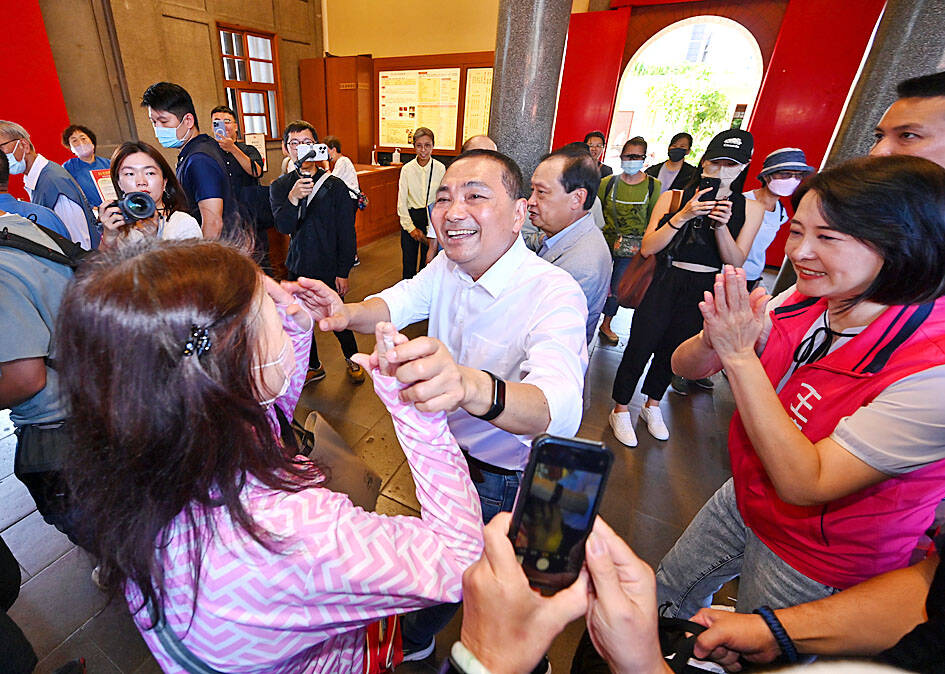The Chinese Nationalist Party (KMT) yesterday announced that it would enter into “party-to-party negotiations” with the Taiwan People’s Party (TPP) over possible collaboration for the Jan. 13 presidential and legislative elections, after deciding there is no longer enough time to hold polls or a primary to decide on a joint presidential candidate.
The two opposition parties have been at loggerheads over how to evaluate the “strongest” presidential candidate to run against Democratic Progressive Party (DPP) presidential candidate Vice President William Lai (賴清德).
With less than 80 days remaining until the election, Lai’s support ranges from 26.5 to 42.6 percent according to Taiwan’s major pollsters, although some polls indicate his lead has fallen slightly.

Photo: Liu Hsin-de, Taipei Times
TPP Chairman and candidate Ko Wen-je (柯文哲) remains in second place, leading the KMT’s Hou You-yi (侯友宜), with tycoon Terry Gou (郭台銘), an independent, in last place.
This indicates that cooperation between Ko and Hou could be crucial if the DPP is to be defeated.
Asked yesterday to comment on the standoff between the KMT and TPP, Hou said with the Nov. 24 deadline for presidential candidate registration looming, neither conducting polls, as proposed by the TPP, nor a primary, as the KMT has insisted on, could be completed in time.
As such, “party-to-party negotiations” are the only viable solution, Hou said, adding that the idea of forming a “governing coalition” proposed by Ko is a non-starter if the two parties do not work together for the elections.
Asked whether there was still a chance the two parties could opt for polls or a primary, Hou answered in the negative, adding that he was “absolutely positive” that the two sides were poised to begin party-to-party talks.
A KMT source, who asked not to be identified, said that the party has no preconditions for party-to-party negotiations and is open to discussing collaboration.
The idea of holding “party-to-party negotiations” to discuss collaboration for the Jan. 13 elections and a governing coalition was first proposed by Ko during a meeting with KMT chairman Eric Chu (朱立倫) earlier this month.
Later in the day, Ko was asked by reporters to respond to the stalemate, but said there are many ways political parties could collaborate that are not limited to the presidential election, including in the legislative elections and pushing bills through the legislature.
Ko also cited a meeting with former legislative speaker Wang Jyn-ping (王金平) on Wednesday, during which Wang suggested that Ko “put yourself in others’ shoes” when it comes to forging a possible KMT-TPP joint presidential ticket.
While still critical of the KMT’s proposed primary and half-poll, half-primary approaches as “unfair,” Ko said he would not insist on a specific course of action, adding that he would agree to hold party-to-party negotiations “since Hou is so persistent.”
Asked whether he would still agree to initiate party-to-party talks if neither a Hou-Ko nor a Ko-Hou ticket were the best combination to defeat Lai, Ko said that had the parties agreed to use polls, the answer would have been clear immediately, but “in real-world scenarios, you cannot always rely on science” and sometimes have to give way to collective wisdom.
Any forthcoming KMT-TPP negotiations should include Hou, Chu and himself, Ko added.

Chinese spouse and influencer Guan Guan’s (關關) residency permit has been revoked for repeatedly posting pro-China videos that threaten national security, the National Immigration Agency confirmed today. Guan Guan has said many controversial statements in her videos posted to Douyin (抖音), including “the red flag will soon be painted all over Taiwan” and “Taiwan is an inseparable part of China,” and expressing hope for expedited reunification. The agency last year received multiple reports alleging that Guan Guan had advocated for armed reunification. After verifying the reports, the agency last month issued a notice requiring her to appear and explain her actions. Guan

GIVE AND TAKE: Blood demand continues to rise each year, while fewer young donors are available due to the nation’s falling birthrate, a doctor said Blood donors can redeem points earned from donations to obtain limited edition Formosan black bear travel mugs, the Kaohsiung Blood Center said yesterday, as it announced a goal of stocking 20,000 units of blood prior to the Lunar New Year. The last month of the lunar year is National Blood Donation Month, when local centers seek to stockpile blood for use during the Lunar New Year holiday. The blood demand in southern Taiwan — including Tainan and Kaohsiung, as well as Chiayi, Pingtung, Penghu and Taitung counties — is about 2,000 units per day, the center said. The donation campaign aims to boost

The Kaohsiung Tourism Bureau audited six hotels in an effort to prevent price gouging ahead of Korean band BTS’ concert tour in the city scheduled for Nov. 19, 21 and 22 this year. The bureau on Friday said that the audits — conducted in response to allegations of unfair pricing posted on social media — found no wrongdoing. These establishments included the local branches of Chateau de Chine, Hotel Nikko, My Humble House, and Grand Hai Lai, it said, adding that the Consumer Protection Commission would have penalized price gougers had the accusations been substantiated. The bureau said the Tourism Development Act

BACK TO WINTER: A strong continental cold air mass would move south on Tuesday next week, bringing colder temperatures to northern and central Taiwan A tropical depression east of the Philippines could soon be upgraded to be the first tropical storm of this year, the Central Weather Administration (CWA) said yesterday, adding that the next cold air mass is forecast to arrive on Monday next week. CWA forecaster Cheng Jie-ren (鄭傑仁) said the first tropical depression of this year is over waters east of the Philippines, about 1,867km southeast of Oluanpi (鵝鑾鼻), and could strengthen into Tropical Storm Nokaen by early today. The system is moving slowly from northwest to north, and is expected to remain east of the Philippines with little chance of affecting Taiwan,